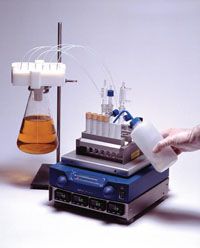Biopharmaceutical research to benefit from organic synthesizer
Activotec is to deliver a PLS organic synthesizer for performing high throughput solution and solid-phase chemistry research to a leading Swiss biopharmaceutical company...
Activotec is to deliver a PLS organic synthesizer for performing high throughput solution and solid-phase chemistry research to a leading Swiss biopharmaceutical company. The acquisition follows a series of purchases for the same item of lab equipment by the customer over the last few years.
Commenting on their choice of supplier - the laboratory manager at the biopharmaceutical company said, "The Activotec PLS organic synthesizer has become our system of choice as it is very simple to set up, easy-to-use and can perform up to 24 reactions simultaneously." He added: "Accommodating a wide selection of glass solution phase and Teflon solid-phase reactors (1 mL to 50 mL) the PLS organic synthesizer is the perfect choice for fast lead generation, reaction optimization, accelerating process development and combinatorial catalysis."
Chris Littlewood, CEO of Activotec, commented, "We are delighted that an increasing number of pharmaceutical companies are adopting the PLS organic synthesizer to assist them with their research and process development." The PLS organic synthesizer was designed for individual chemists to use in their own fume cupboards. The unit offers the versatility to be adapted to operate at elevated (up to 150 ºC) or sub-ambient temperatures (80 ºC).
For more information please visit the company's website www.activotec.com
LCGC’s Year in Review: Highlights in Liquid Chromatography
December 20th 2024This collection of technical articles, interviews, and news pieces delves into the latest innovations in LC methods, including advance in high performance liquid chromatography (HPLC), ultrahigh-pressure liquid chromatography (UHPLC), liquid chromatography–mass spectrometry (LC–MS), and multidimensional LC.
Using LC-MS/MS to Measure Testosterone in Dried Blood Spots
December 19th 2024Testosterone measurements are typically performed using serum or plasma, but this presents several logistical challenges, especially for sample collection, storage, and transport. In a recently published article, Yehudah Gruenstein of the University of Miami explored key insights gained from dried blood spot assay validation for testosterone measurement.
